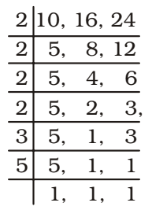LCM and HCF
- The smallest square number divisible by 10, 16 and 24 is
-
View Hint View Answer Discuss in Forum
We find LCM of = 10, 16, 24

∴ LCM = 22 × 22 × 3 × 5
∴ Required number = 2 × 2 × 2 × 2 × 3 × 3 × 5 × 5Correct Option: D
We find LCM of = 10, 16, 24

∴ LCM = 22 × 22 × 3 × 5
∴ Required number = 2 × 2 × 2 × 2 × 3 × 3 × 5 × 5
Required number = 3600
- The least number, which when divided by 12, 15, 20 or 54 leaves a remainder of 4 in each case, is :
-
View Hint View Answer Discuss in Forum
Here , Remainder ( r ) = 4
As we know that When a number is divided by a, b , c or d leaving same remainder ‘r’ in each case then that number must be k + r where k is LCM of a, b , c and d.
So , LCM of 15, 12, 20, 54 ( k ) = 540Correct Option: D
Here , Remainder ( r ) = 4
As we know that When a number is divided by a, b , c or d leaving same remainder ‘r’ in each case then that number must be k + r where k is LCM of a, b , c and d.
So , LCM of 15, 12, 20, 54 ( k ) = 540
Hence , Then number = k + r = 540 + 4 = 544
- The least number which when divided by 4, 6, 8, 12 and 16 leaves a remainder of 2 in each case is :
-
View Hint View Answer Discuss in Forum
Here , Remainder ( r ) = 2
As we know that When a number is divided by a, b , c or d leaving same remainder ‘r’ in each case then that number must be k + r where k is LCM of a, b , c and d.
So , L.C.M. of 4, 6, 8, 12 and 16 = k = 48Correct Option: C
Here , Remainder ( r ) = 2
As we know that When a number is divided by a, b , c or d leaving same remainder ‘r’ in each case then that number must be k + r where k is LCM of a, b , c and d.
So , L.C.M. of 4, 6, 8, 12 and 16 = k = 48
∴ Required number = k + r = 48 + 2 = 50
- The H.C.F. and L.C.M. of two numbers are 44 and 264 respectively. If the first number is divided by 2, the quotient is 44. The other number is
-
View Hint View Answer Discuss in Forum
Given , The H.C.F. and L.C.M. of two numbers are 44 and 264 .
According to question ,
First number = 2 × 44 = 88
As we know that ,
∴ First number × Second number = H.C.F. × L.C.M.
⇒ 88 × Second number = 44 × 264Correct Option: C
Given , The H.C.F. and L.C.M. of two numbers are 44 and 264 .
According to question ,
First number = 2 × 44 = 88
As we know that ,
∴ First number × Second number = H.C.F. × L.C.M.
⇒ 88 × Second number = 44 × 264⇒ Second number = 44 × 264 = 132 88
- Find the greatest number of five digits which when divided by 3, 5, 8, 12 have 2 as remainder :
-
View Hint View Answer Discuss in Forum
Here , Remainder ( r ) = 2
As we know that When a number is divided by a, b , c or d leaving same remainder ‘r’ in each case then that number must be k + r where k is LCM of a, b , c and d.
The greatest number of five digits is 99999.
LCM of 3, 5, 8 and 12
∴ LCM = 2 × 2 × 3 × 5 × 2 = 120
After dividing 99999 by 120, we get 39 as remainder
99999 – 39 = 99960 = ( 833 × 120 )Correct Option: D
Here , Remainder ( r ) = 2
As we know that When a number is divided by a, b , c or d leaving same remainder ‘r’ in each case then that number must be k + r where k is LCM of a, b , c and d.
The greatest number of five digits is 99999.
LCM of 3, 5, 8 and 12
∴ LCM = 2 × 2 × 3 × 5 × 2 = 120
After dividing 99999 by 120, we get 39 as remainder
99999 – 39 = 99960 = ( 833 × 120 )
99960 is the greatest five digit number divisible by the given divisors.
In order to get 2 as remainder in each case we will simply add 2 to 99960.
∴ Greatest number = 99960 + 2 = 99962

